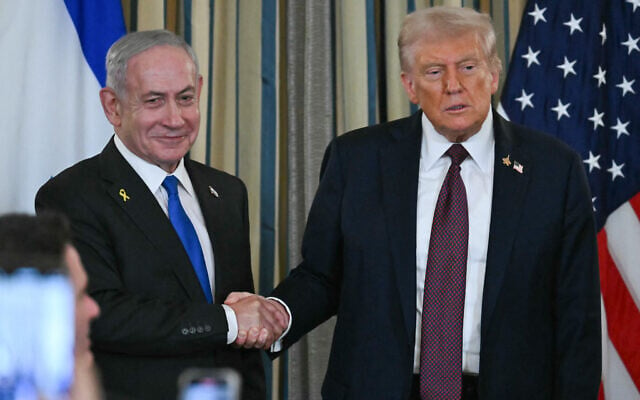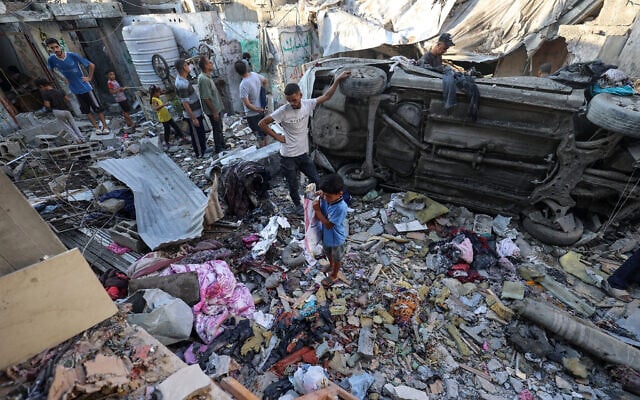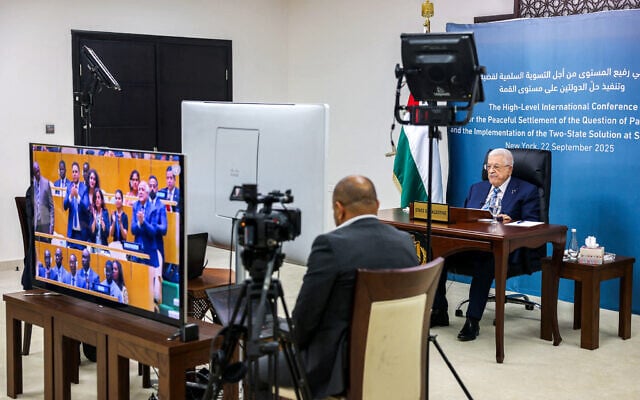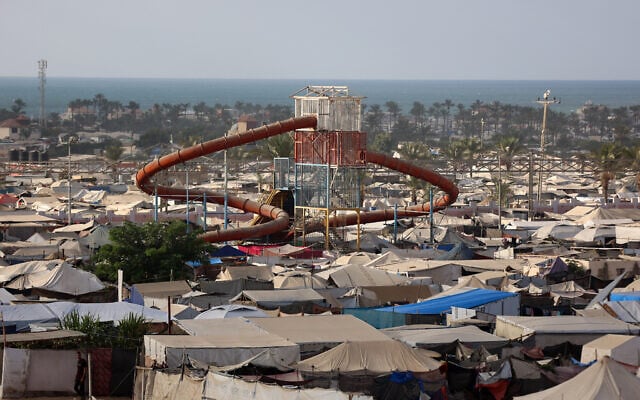

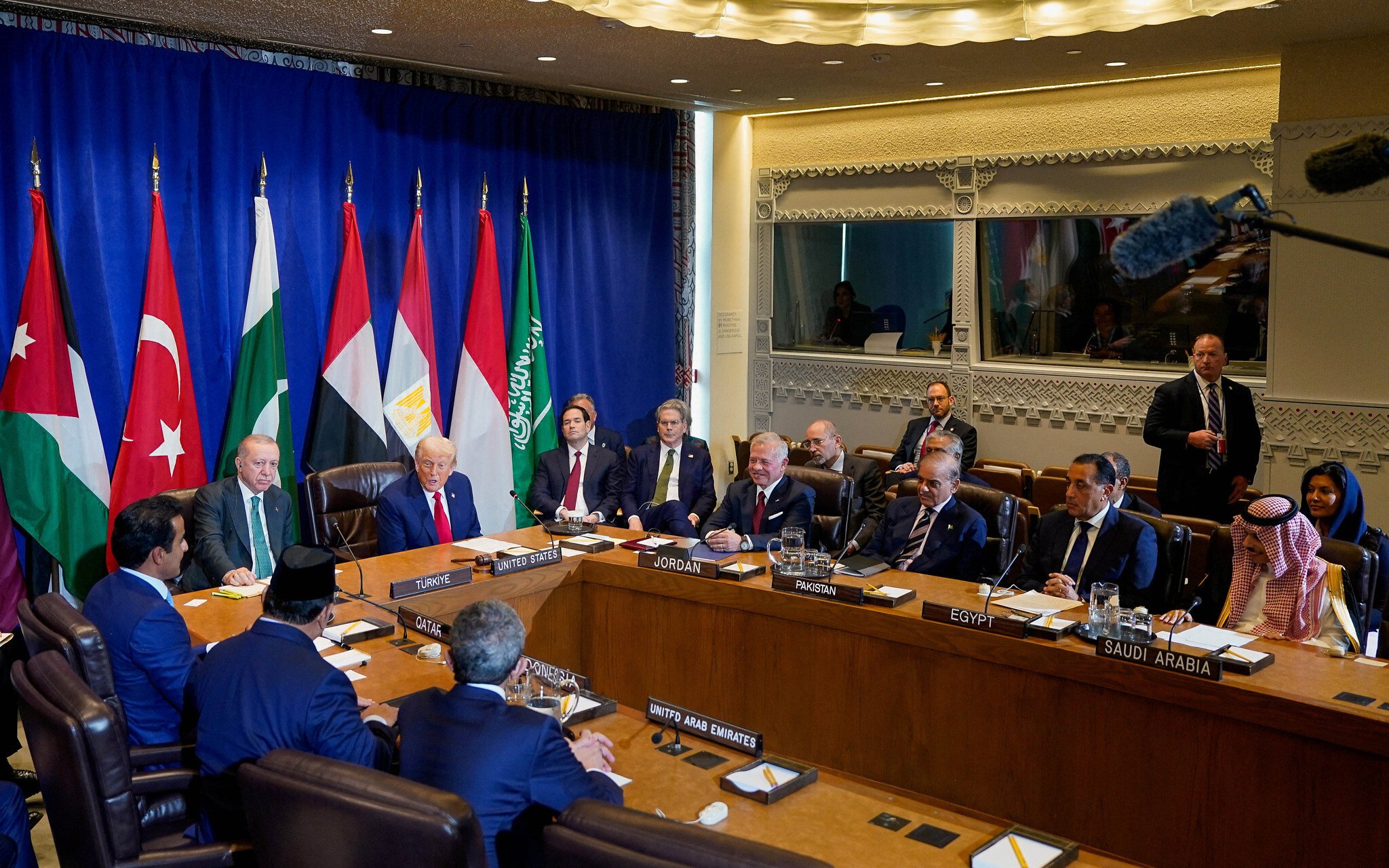
The foreign ministers of eight Arab and Muslim majority countries issued a joint statement on Monday welcoming US President Donald Trump’s vision for ending the war in Gaza and restoring peace to the region, even as the Hamas terror group, which must agree to the deal for it to be fully implemented, had yet to issue a response.
The statement, published by the foreign ministers of Saudi Arabia, Jordan, the United Arab Emirates, Indonesia, Pakistan, Türkiye, Qatar, and Egypt welcomed Trump’s “sincere efforts” toward ending the war, and asserted their “confidence in his ability to find a path to peace.”
Trump’s 20-point plan, titled “Comprehensive Plan to End the Gaza Conflict,” was made public by the White House shortly before Trump’s joint press conference with Prime Minister Benjamin Netanyahu, who confirmed that Israel had accepted the proposal.
Hamas has yet to respond to the plan, although Qatari news outlet Al Jazeera reported that Qatar and Egypt had conveyed it to the terror group, and that the Hamas delegation promised to examine the proposal “responsibly.”
Noting the “importance of the partnership with the United States in securing peace in the region,” the eight Arab and Muslim top diplomats “reaffirm[ed] their joint commitment to engage positively and constructively with the United States and the parties toward finalising the agreement and ensuring its implementation.”
“They reaffirm their joint commitment to work with the United States to end the war in Gaza through a comprehensive deal that ensures unrestricted delivery of sufficient humanitarian aid to Gaza, no displacement of the Palestinians, the release of hostages, a security mechanism that guarantees the security of all sides, full Israeli withdrawal, rebuilds Gaza and creates a path for a just peace on the basis of the two state solution, under which Gaza is fully integrated with the West Bank in a Palestinian state in accordance with international law as key to achieving regional stability and security,” the statement added.
Of the countries signed onto the statement, Israel has relations, in varying states of health, with Egypt, Jordan, the UAE and Türkiye.
Neither Qatar nor Saudi Arabia has any formal ties with Israel, although Qatar has played a key mediatory role in negotiations over the past two years of war, and Israel is eyeing normalization with Riyadh further down the line.
Indonesia and Pakistan, the world’s two most populous Muslim-majority countries, have indicated that they will not establish diplomatic ties with Israel until it has committed to the creation of a Palestinian state.
Still, Indonesia has offered troops as part of a future Gaza force, while Pakistan has been eager to woo Trump and improve its relationship with Washington.
Trump hailed a statement by Pakistani Prime Minister Shehbaz Sharif, posted on X even before the White House announcement, in which he voiced his “firm belief that President Trump is fully prepared to assist in whatever way necessary” to secure an end to the war.
Trump’s 20-point plan, if accepted by both sides, will immediately put an end to the fighting in Gaza and ensure that all remaining hostages are freed within 72 hours. Hamas members who commit to peaceful coexistance and to decommission their weapons will be given amnesty, and those who wish to leave Gaza will be provided safe passage.
Aid will then flow into the war-torn enclave, and a process of demilitarizing, deradicalizing, and redeveloping the Strip will begin.
A transitional government of Palestinian technocrats will be established, alongside an international advisory board chaired by Trump and including former UK prime minister Tony Blair. A temporary international security force (ISF) will be deployed to the Strip, which will gradually take over from the IDF as it withdraws.
Meanwhile, the Palestinian Authority will undergo long-demanded reforms until it is determined that the conditions are in place for a “credible pathway to Palestinian self-determination and statehood.”
The plan does not provide a timeline for this, choosing instead to leave it open-ended.
The Palestinian Authority nevertheless welcomed Trump’s “sincere and determined efforts” to end the war in Gaza, and affirmed “its confidence in his ability to find a path toward peace.”
The PA vowed to work with American, regional, and other partners on a comprehensive deal that delivers aid to Gaza, frees the hostages held there as well as Palestinian security prisoners held in Israeli prisons, ensures IDF withdrawal, and advances a two-state solution alongside internal reforms, swift elections, and building a democratic, demilitarized state.
The statement, published both in English and Arabic, stressed that it was committed to carrying out a series of long-demanded reforms to the structure of the Ramallah-based PA, including “holding presidential and parliamentary elections within one year after the end of the war,” and ensuring that all candidates meet both the PLO’s guidelines. and those of the international community.
“We have affirmed our desire for a modern, democratic, and non-militarized Palestinian state, committed to pluralism and the peaceful transfer of power,” the PA noted, adding that it would also carry out reforms to its school curriculum, which Israel has long said contains incitement to terror.
Not everyone was so effusive, however.
The Palestinian Islamic Terror group, which is still holding at least one hostage in the Gaza Strip, said in a scathing statement that Trump’s plan would fuel further aggression against Palestinians.
“It is a recipe for continued aggression against the Palestinian people. Through this, Israel is attempting — via the United States — to impose what it could not achieve through war,” the group said.
“Therefore, we consider the American-Israeli declaration a formula for igniting the region.”
On the ground in the war-ravaged Palestinian enclave, opinion was split as to whether Trump’s ambitious plan could create change on the ground, with some dismissing it as a farce that would fail to end the war.
“It’s clear that this plan is unrealistic,” 39-year-old Ibrahim Joudeh told AFP from his shelter in the so-called humanitarian zone of Al-Mawasi in south Gaza.
“It’s drafted with conditions that the US and Israel know Hamas will never accept. For us, that means the war and the suffering will continue,” said the computer programmer, originally from the southern city of Rafah, devastated by a military offensive that began in May.
Abu Mazen Nassar, 52, was equally pessimistic and feared that the plan aimed to trick Palestinian terror groups into releasing hostages held in Gaza, and no peace in return.
“This is all manipulation. What does it mean to hand over all the prisoners without official guarantees to end the war?” said Nassar, displaced from his home in north Gaza in central Gaza’s Deir al-Balah.
“We as a people will not accept this farce,” he said, adding that “whatever Hamas decides now about the deal, it’s too late.”
“Hamas has lost us and drowned us in the flood it created.”
Some, like Anas Sorour, a 31-year-old street vendor from the southern Gaza city of Khan Younis, also displaced to Al-Mawasi, dared to hope.
“Despite everything we’ve lived through and lost in this war… I still have hope,” Sorour told AFP.
“No war lasts forever. This time I am very optimistic, and God willing it will be a moment of joy that makes us forget our pain and our anguish,” he added.
But others, like 29-year-old homemaker Najwa Muslim, could no longer imagine anything changing.
“I haven’t only lost faith in the deal; I’ve lost faith in life”, Muslim told AFP from central Gaza, where she sought refuge after being displaced from Gaza City, currently under a massive Israeli military offensive.
“If there was a real intention to stop the war, they wouldn’t have waited this long. That’s why I don’t believe any of their words.”
Mohammed al-Beltaji, a 47-year-old from Gaza City, summarized his view of negotiations to AFP.
“As always, Israel agrees, then Hamas refuses — or the other way around. It’s all a game, and we, the people, are the ones paying the price.”
Times of Israel staff contributed to this report.


